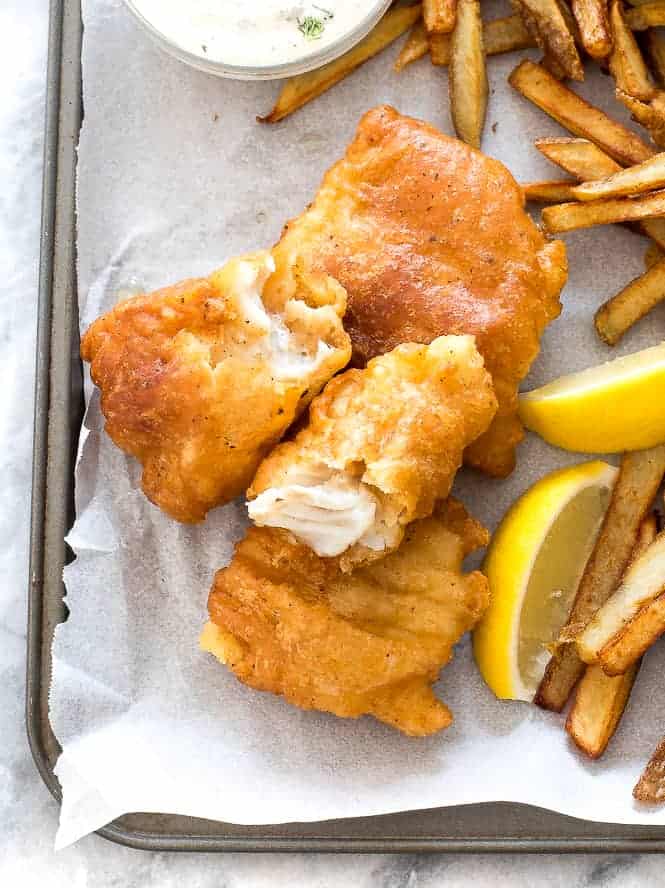Delightful Homemade Fish and Chips for Family Fun Nights!
Welcome, lovely parents! Are you in search of a fantastic, family-friendly meal that’s not only delicious but can bring the whole family together in the kitchen? Well, let me guide you through the delightful world of making your very own homemade fish and chips! It’s easier than you think and makes for a fun kitchen adventure with your little ones. So, roll up your sleeves, get your aprons ready, and let’s create some golden, crispy joy!
The Origins of This Classic British Dish
Before we dive into the batter, let’s take a quick trip down memory lane. Fish and chips, a historic British staple, has won hearts around the globe. Originating from the UK in the 1800s, this beloved dish represents comfort food at its finest. Now, it’s your turn to bring this classic right into your own home with a healthier, homemade twist!
Ingredients You’ll Need
Gathering your ingredients is the first step to culinary success. Here’s what you’ll need to create your homemade masterpiece:
- Fresh white fish fillets (such as cod or haddock)
- Potatoes (choose a variety that’s good for frying, like Maris Piper or Yukon Gold)
- All-purpose flour
- Beer or sparkling water (for that airy, crisp batter)
- Baking powder (our little secret for extra fluffiness)
- Salt and pepper (to taste)
- Vegetable oil or lard (for that authentic fry)
- Your favorite herbs and spices (to customize your batter)
The Perfect Batter for Your Fish
Now, let’s talk about the star of our show — the batter! A great batter is light, airy, and crisp, and the key to achieving this is simple: cold liquid and a light touch. Whether you choose beer or sparkling water, ensure it’s chilled for that ultimate crunch. Here’s how you make it:
- In a bowl, mix flour, baking powder, salt, and pepper.
- Gently pour in your cold beer or sparkling water, whisking lightly until you achieve a smooth, lump-free batter.
- Add your secret blend of herbs and spices to give it a personal twist.
- Keep the batter in the fridge while you prep your fish to maintain its cool temperature.
Choosing and Preparing Your Fish
Selecting the right fish is vital. Fresh, sustainably sourced fish is not only better for the environment but also superior in taste. Once you have your fish, pat it dry, and season it with salt and pepper. Hint: Cutting the fish into smaller pieces can make it more manageable for little hands to eat!
Chips: The Trusty Sidekick
What’s fish without chips? Let’s make sure your pile of golden sticks is equally as impressive. Here’s a simple method to get those perfect homemade chips:
- Peel your potatoes and cut them into chip shapes. Soak them in water to remove excess starch — this helps them become extra crispy!
- Boil the potatoes gently for a few minutes, then drain and dry.
- Pre-heat your oven to a warm setting – this is where you’ll keep your completed chips warm while you fry the fish.
- Fry the chips in batches, once lightly at a lower temperature, and then again at a high temperature to achieve that golden crunch.
- Sprinkle with salt (or any seasoning you fancy) and keep them warm in the oven.
Cooking together as a family isn’t just about the delicious results, it’s about creating those special moments that come from sharing the process. As you embark on this culinary adventure, you’re not just cooking up fish and chips; you’re cooking up memories.
Ready to get sizzling? Follow along with our easy-to-do steps and let the fun times roll. And remember, the best ingredient of all is a sprinkle of laughter and a heap of love. Happy cooking!

5 Things Parents Should Know When Preparing Homemade Fish and Chips
1. Safety First: Hot Oil Precautions
When frying, safety is paramount. Keep young helpers at a safe distance when hot oil is in use. Use a deep, heavy-bottomed pot to avoid splatter and maintain a stable temperature. Always be attentive when frying, never leaving hot oil unattended. Teaching your children cooking safety is as important as the recipe itself!
2. Healthier Options for Everyone
Homemade fish and chips let you control what goes onto your family’s plate. Choose heart-healthy oils such as canola or sunflower for frying. Additionally, oven-baking the chips and even the fish can be a wonderful alternative to frying, reducing the amount of oil needed for those who prefer a lighter option.
3. Time Management for Busy Parents
This delightful meal can be made ahead of time to some extent. Prepare your batter and cut your chips in advance, storing them in the fridge until you’re ready to fry. Fish and chips require your full attention only in the last few steps, so use time effectively to ensure you can focus on achieving that perfect golden finish.
4. Engaging Your Kids in the Kitchen
Making fish and chips at home is an excellent way to get your kids interested in cooking. Let them help with safe tasks like whisking the batter, seasoning the fish, and drying the potatoes. This hands-on experience is not only educational but can also inspire a lifelong love for homemade food.
5. Customization for Picky Eaters
Not everyone in the family may like fish, or perhaps someone loves a specific herb on their chips. The beauty of homemade is that you can adjust ingredients to suit everyone’s tastes. Use this recipe as a base and then experiment with different types of fish, batter seasonings, or chip spices to make a meal that everyone will look forward to.
Now that you’re prepared with these handy tips, it’s time to gather the family and embark on this delicious journey to make your own homemade fish and chips. It’s more than a meal; it’s an opportunity to come together, have fun, and create something scrumptious that everyone will enjoy. And the best part? You’ll have the satisfaction of knowing you provided a wholesome and tasty experience for the whole family. Let’s get frying, and most of all, let’s make those wonderful memories!
See more great Things to Do with Kids in New Zealand here. For more information see here
Disclaimer
The articles available via our website provide general information only and we strongly urge readers to exercise caution and conduct their own thorough research and fact-checking. The information presented should not be taken as absolute truth, and, to the maximum extent permitted by law, we will not be held liable for any inaccuracies or errors in the content. It is essential for individuals to independently verify and validate the information before making any decisions or taking any actions based on the articles.




